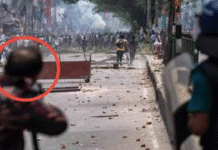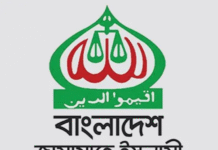
Food grains reached India’s north-eastern state of Tripura from southern state of Andhra Pradesh on Thursday, using Bangladesh river port and roads for the first time.
After three-year-long diplomatic and strategic parleys, three Bangladeshi trucks, each loaded with 340 sacks of rice weighing 17 tonnes, entered the state capital Agartala around 2.45pm (Indian time) through the Akhaura integrated check post.
“This is for the first time that Bangladeshi trucks, carrying rice from Ashuganj port in Bangladesh, have directly entered the FCI warehouse at Nandannagar with Indian police escorts. We have done this to reduce the cost and prevent a second transhipment at the Akhaura India-Bangladesh border,” Food Corporation of India (FCI) general manager Bidol Tayeng said.
He said: “To allow Bangladeshi trucks 7-km inside Indian territory from Akhaura border, the Ministry of External Affairs (MEA) had earlier given clearances. The rice loaded trucks had to go through the ‘truck scanners’, installed at the Akhaura check post.”
The first consignment of 5,000 tonnes of rice from Kakinada port in Andhra Pradesh reached in small ships at Ashuganj river port in (eastern) Bangladesh via Kolkata port on August 5.
Around 20 trucks of rice are likely to enter Agartala everyday from Ashuganj port in the next 12 to 13 days.
The trucks were suppose to cross the border at 8 am (IST) but were delayed due to paperwork- related complication.
Bangladeshi business community, welcoming the new step between the two nations, said the arrangement would be a win-win situation for both the neighbours.
“Bangladesh has offered a free transit to India and this will reduce the transportation cost and will surely help in further strengthening our relation. Moreover, we hope if this is a success then in future Bangladesh will also make profit as India will pay for using Bangladeshi ports and roads,” pointed out Abbasuddin Bhuiya, a clearing and forwarding agent at the Akhaura land custom port on Bangladesh side.
Meanwhile, Tripura Food, Civil Supplies and Consumer Affairs Minister Bhanulal Saha said : “The rice, meant for Public Distribution System, are being ferried via Bangladesh since there will be a major rail block for the next few months due to gauge conversion work and moreover, to avoid long and mountainous surface road up to Tripura via Assam and Meghalaya.”
Saha said in the next phase, another 5,000 tonnes of rice would be ferried to Tripura in the same manner and through the same route.
Ashuganj river port in eastern Bangladesh is around 37 km from Agartala. The rice-loaded trucks would reach Agartala from Ashuganj (under Brahmanbaria district of Chittagong division of Bangladesh) within two hours.
The eight north-eastern states, including Sikkim, are largely dependent on the bigger states, especially northern Indian states Punjab and Haryana, for food grain and essential commodities.
In view of conversion of railway lines from metre gauge to broad gauge, the Northeast Frontier Railway (NFR) will stop train services to Tripura, Manipur, Mizoram and southern Assam from October this year to June next year.
Hence carrying food grains and other essentials from different parts of the country to north-eastern states of India via Bangladesh is very vital.
India is trying to open a new route to bring food grains and essentials for its north-eastern region via Bangladesh on a regular basis or as and when the situation arises.
The Bangladesh government following three-year-long diplomatic and strategic parleys has, under a special transit facility, agreed to transport 10,000 tonnes of food grain to Tripura without taking any kind of duty.
“After getting a positive gesture from the Bangladesh government, the FCI started the process three years back to transport food grain and essentials from southern India using the Ashuganj river port and the roadways connected to the north-eastern states,” FCI general manager Tayeng said.
“After Tripura, food grain would likely be ferried through Bangladesh for other north-eastern states, including Mizoram, Manipur and southern Assam, to save time and costs.”
The FCI had earlier floated tenders to select Bangladeshi transporters. After a series of diplomatic and administrative parleys involving various Bangladeshi ministries and India’s food, finance, shipping and MEA, the long-pending matter was settled recently.
Earlier, in 2012, Bangladesh had allowed India’s state-owned Oil and Natural Gas Corporation (ONGC) to ferry heavy machinery, turbines and cargo through Ashuganj port for the 726 MW Palatana mega power project in southern Tripura.
The Indian government had spent several millions of rupees to develop the port and related infrastructure.
Due to shortage of rail wagons, inadequate storage facilities and various other bottlenecks, the north-eastern states have been suffering from poor supply of food grain for most part of the year, especially during the monsoon (June to September).
Surface connectivity is a key factor as the mountainous north-eastern region is surrounded by Bangladesh, Myanmar, Bhutan and China, and the only land route to these states from within India is through Assam and West Bengal.
During the monsoon season, road transport becomes very difficult due to floods and landslides. Frequent strikes and road blockade by various groups, further aggravate the situation.
For ferrying essentials, goods and heavy machinery from abroad and other parts of the country, India has for long been asking Bangladesh land, sea and rail access to the northeast.
Agartala via Guwahati, for instance, is 1,650 km from Kolkata. The distance between Agartala and Kolkata via Bangladesh is just about 350 km.
The FCI is carrying the food grain via Bangladesh in association with the Inland Waterways Authority of India (IWAI), involving private transporters.
Indian and Bangladeshi waterways connect West Bengal (Haldia and Kolkata ports) and Assam (Karimganj port). The IWAI and Bangladesh Inland Water Transport Authority (BIWTA) are operating vessels on these routes.
The two neighbours share 2,979 km of land border and 1,116 km of riverine boundary and also share 54 rivers, including eight flowing from Tripura.
Source: Bd news24










Good for India. When will Bangladesh get something in return I wonder?
In fact Bangladesh has been posed as a kept to India and for this the present Hasina govt is fully responsible. It would rather have been better had Bangladesh merged with India. At least then Bangladesh would be strong enough to put up her strong stand. No hope for Bangladesh getting any better treatment so long as the present govt is in power.